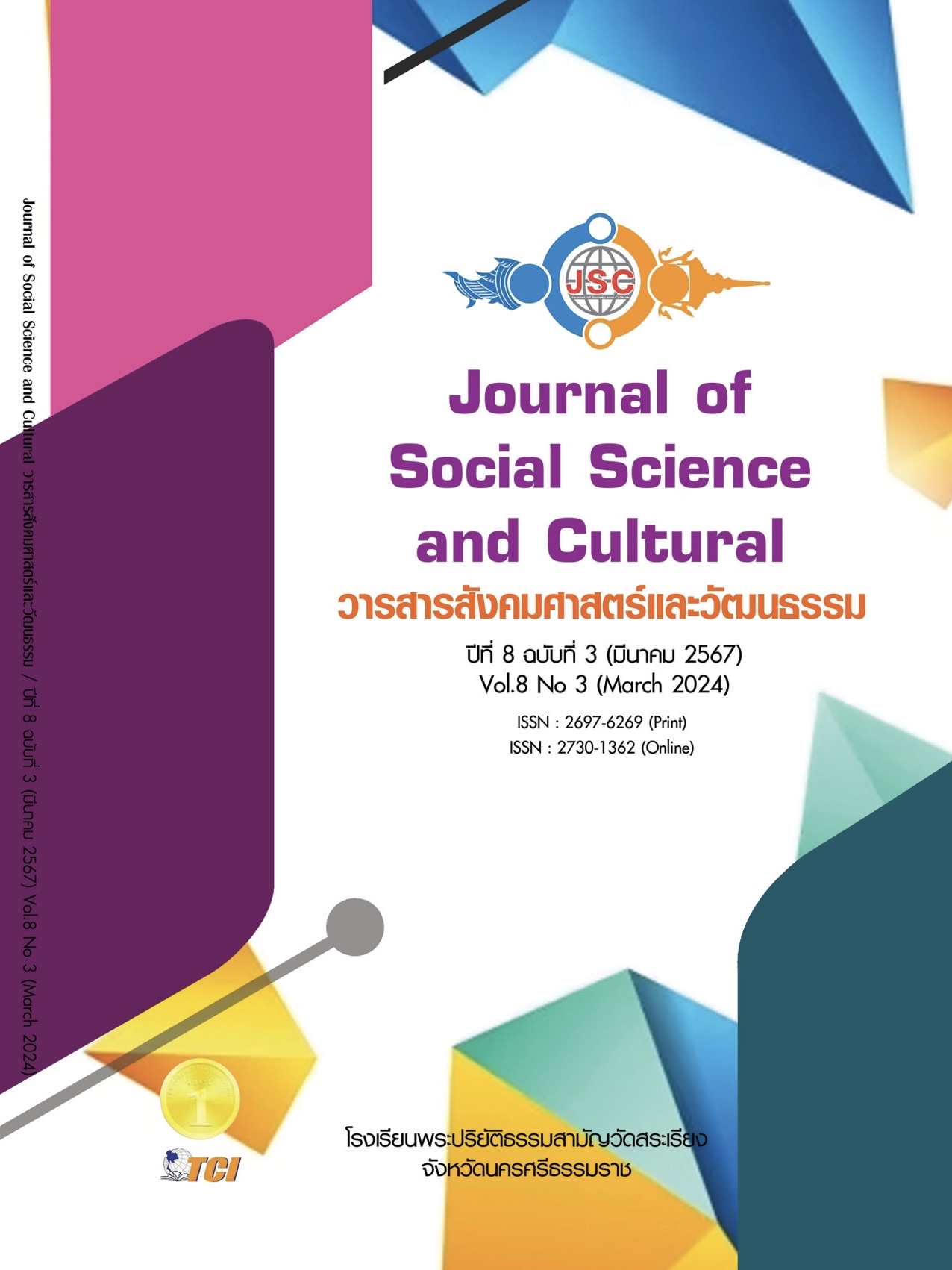LEGAL MEASURES TO PROTECT AND PREVENT THE IMPORTATION OF PERSONAL DATA VIA COMPUTERS IN ACCORDANCE WITH THE LAW ON COMPUTER CRIME
Main Article Content
Abstract
The purposes of this research are to 1) analyze the differences in legal measures of foreign countries and Thailand related to the protection of computer data imports, 2) study the problems, obstacles and limitations of legal measures to protect the import of computer data on computers according to the Computer Crimes Act and 3) propose guidelines for revising legal measures to protect the import of computer data according to the Computer Crimes Act. Using qualitative research methods including document analysis. and in-depth interviews Legal experts, 12 people. The research results found that Laws regarding foreign computer crimes Focus on protecting personal information Computer crimes are crimes. It is a serious threat to the economy, society, and national security. The level of protection is higher than Thai law. Realize the severity of the consequences. There are penalties based on the level of damage and high fines, but Thai law views computer crime as a specific problem. It does not have a wide impact. Focus on actual damage. The punishment emphasizes imprisonment. Problems with the Computer Crime Act include: The definition of personal data is unclear. It creates confusion for organizations when importing data, difficult to enforce the law there are provisions regarding the importation of computer data. But it does not focus on protecting personal information. The punishment is not severe. Unable to stop violations of the law guidelines for amending the law to protect the import of personal data via computer is to amend the Computer Crime Act (No. 2) B.E. 2017 to make it clear. Increase the severity of the punishment Develop a mechanism for tracking and monitoring performance, and promote international cooperation
Article Details
References
เครือข่ายพลเมืองเน็ต. (2557). การละเมิดความเป็นส่วนตัวออนไลน์ในสังคมไทย พ.ศ. 2556. เรียกใช้เมื่อ 13 ธันวาคม 2565 จาก https://thainetizen.org/wp-content/uploads/2014/03/ thainetizen-privacy-report-2013.pdf
ณัฐสุดา อัคราวัฒนา และธานี วรภัทร์. (2561). การกำหนดความผิดทางอาญาเกี่ยวกับคอมพิวเตอร์. ใน วิทยานิพนธ์นิติศาสตรมหาบัณฑิต สาขาวิชานิติศาสตร์. มหาวิทยาลัยธุรกิจบัณฑิตย์.
นิกร โภคอุดม. (2563). ความเป็นส่วนตัวในยุคดิจิทัล. วารสารมหาวิทยาลัยอีสเทิร์นเอเชีย ฉบับวิทยาศาสตร์และเทคโนโลยี, 14(2), 59-69.
ปัทมา มัญชุนากร. (2565). ปัญหากฎหมายเกี่ยวกับการคุ้มครองข้อมูลส่วนบุคคลในเครือข่ายสังคมออนไลน์: ศึกษากรณีผู้ควบคุมข้อมูลส่วนบุคคลหลายราย. วารสารรัชต์ภาคย์, 16(47), 89-107.
พัฒนะ ศุกรสุต. (2563). “ชีวิตวิถีใหม่” อยู่ภายใต้ภัยคุกคามทางไซเบอร์ แนะออกแบบระบบรองรับทำงานได้แม้ถูกโจมตีผู้จัดการออนไลน์ 2 มิถุนายน 2563. เรียกใช้เมื่อ 13 ธันวาคม 2565 จาก http://www. mgronline.com/onlinesection/detail/9630000063688
รุ่งอรุณ รุ่งทองคำกุล. (2558). ปัญหาทางกฎหมายอันเกิดจากการละเมิดสิทธิในความเป็นส่วนตัวและข้อมูลส่วนบุคคลของเด็กจากการใช้งานบนเครือข่ายอินเทอร์เน็ต. ใน วิทยานิพนธ์นิติศาสตรมหาบัณฑิต สาขาวิชานิติศาสตร์. มหาวิทยาลัยธุรกิจบัณฑิตย์.
สาวิตรี สุขศรี และปวีร์ เจนวีระนนท์. (2566). ความรู้ทางกฎหมายหลากหลายและเข้าใจง่าย ชุดที่ 20: Cyber Crime เมื่อโลกออนไลน์เต็มไปด้วยอาชญากรรม: อาชญาวิทยาและบทบาทของกฎหมาย. ปทุมธานี: คณะนิติศาสตร์ มหาวิทยาลัยธรรมศาสตร์.
สุนทร เปลี่ยนสี. (2551). แนวความคิดและหลักการของกฎหมายว่าด้วยการกระทำความผิดเกี่ยวกับคอมพิวเตอร์. กรุงเทพมหานคร: สำนักงานคณะกรรมการกฤษฎีกา.
อุษณีย์ ตันสูงเนิน. (2565). มาตรการทางกฎหมายในการกำกับดูแลผู้ให้บริการทางอินเทอร์เน็ต และการคุ้มครองเด็ก และเยาวชนที่ถูกกลั่นแกลงผ่านไซเบอร์. วารสารปัญญาปณิธาน, 7(1), 31-40.
Atta Ul Haq, Q. (2021). Cyber crime and their restriction through laws and techniques for protectingsecurity issues and privacy threats. In In Security Issues and Privacy Threats in Smart Ubiquitous Computing (pp. 31-63). Singapore: Springer.
Grujić, Z., & Blagić, P. D. (2019). Incriminations Against Security of Computer Data–Effectiveness of Criminal Justicemechanism Directed on Cyber Crime. Archibald Reiss Days, 8(1), 293-304.
Nwankwo, W., & Ukaoha, K. C. (2019). Socio-technical perspectives on cybersecurity: Nigeria’s cybercrime legislation in review. International Journal of Scientific and Technology Research, 8(9), 47-58.


